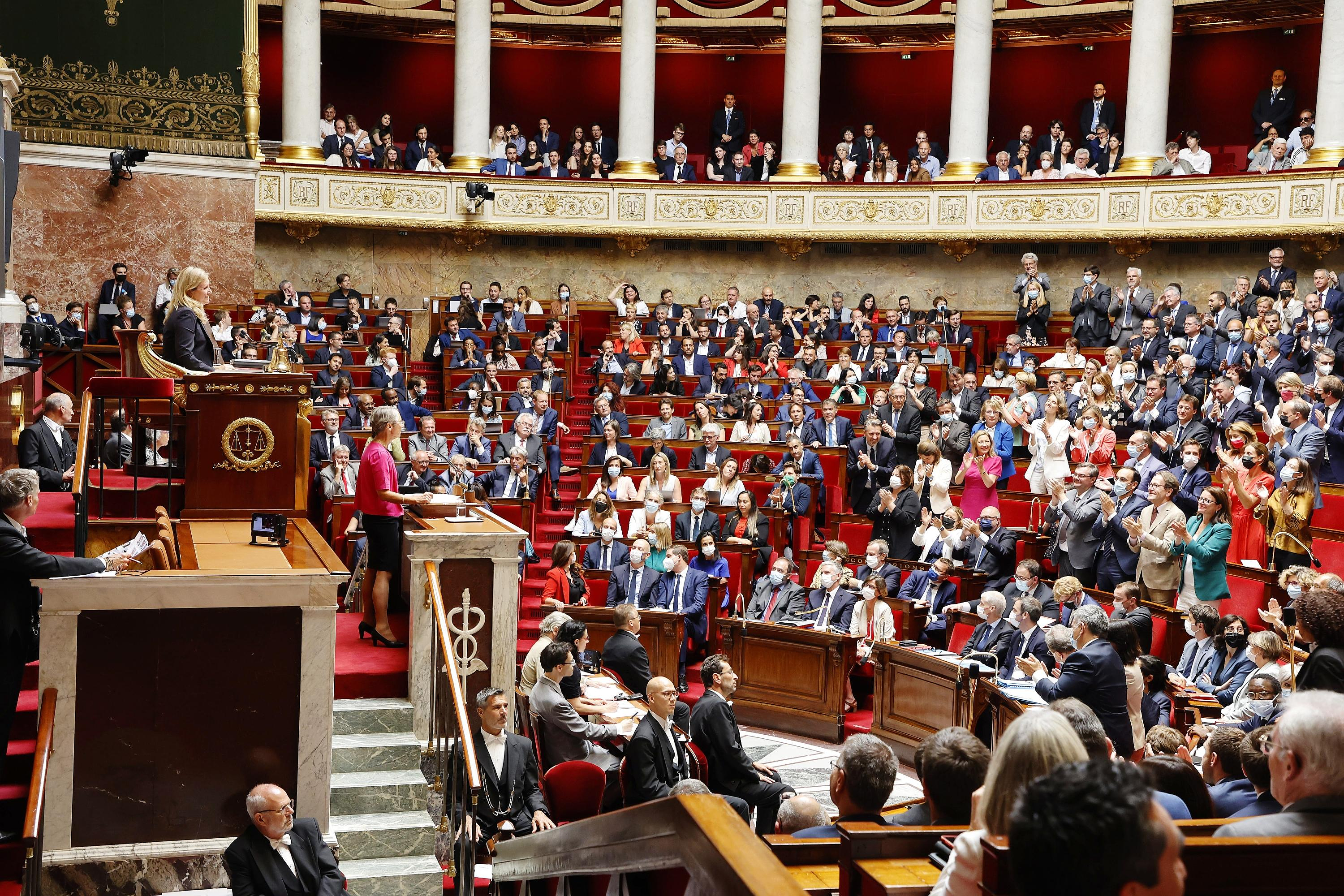In the agenda of this extraordinary session of the Plenary, the proposal of eight members to address the European Commission to report on the agreement approved on June 27 by the Governing Chamber of the Supreme Court has been included.
The Plenary of the CGPJ will meet next Monday to decide its response to the legal reforms that have limited it from making appointments: the last one, the legislative initiative of the socialist parliamentary group to overcome the legal impediment imposed on this body to make appointments while in office and thus be able to appoint two magistrates of the TC.
In this way, the agenda of this extraordinary session of the Plenary has included the proposal of eight members to address the European Commission to report on this new legislative initiative and the agreement approved on June 27 by the Chamber of Government of the Supreme Court.
In said agreement, the CGPJ is demanded to transmit to the Congress of Deputies and the Senate its "deep concern" about the lack of renewal of the Council and the legal impossibility of making appointments, and that "they are creating a situation in the high court that, If it continues, it will be unsustainable."
Initially, this meeting of the Plenary Session of the General Council of the Judiciary was going to be held on June 30, but it had to be suspended because one of its members, Victoria Cinto Lapuente, died that same morning in San Sebastián at 63 years old.
Now, the president of the CGPJ, Carlos Lesmes, has resumed that plenary call for next Monday, July 11 at 5 in the afternoon and will proceed to assess the proposal of those eight members, of a conservative nature, which also includes the possibility of request Congress to obtain a report from the governing body of the judges on the reform proposed by the socialist parliamentary group in order to appoint two magistrates of the Constitutional Court.
The proposal aims to agree to return to the CGPJ "fully" the powers for discretionary judicial and governmental-judicial appointments, as well as address the European Commission to report on the aforementioned bill.
The legislative initiative of the PSOE aims to circumvent the impediment imposed on the CGPJ to make appointments while in office, to only be able to appoint those two magistrates of the TC.
An obstacle to appointments that was promoted at the time also at the initiative of the Socialists to force the renewal of this body that has already lasted three years and six months, and which is the one that has also been questioned by the Governing Chamber of the Supreme Court in the writing that the CGPJ will also see on Monday.
The members who have addressed this matter to the Plenary recognize in their proposal that although the report they ask to address to Congress is not considered mandatory when it comes to bills, they maintain that European jurisprudence "imposes" that when these refer "to the nuclear aspects of the status of the members of the Judiciary or that affect the status or functions of the members of the governing body of the Judiciary, must be processed hearing all the sectors involved.
The proposal has been signed by vocals Jose Antonio Crossbow, Angels Carmona, Nuria Diaz, Juan Manuel Fernandez, Jose Maria Macias, Juan Martinez Moya, Gerardo Martinez Tristan and Carmen Llombart.
According to these members, the proposed legislative initiative "seeks to reform LO 4/2021, of March 29, in order to enable the CGPJ to propose the appointment of two magistrates of the Constitutional Court", and with it and "as can be read in the statement of reasons", to avoid "the difficulties that the current text entails for the renewal of the constitutional bodies", they explain.
A justification that they consider "contradictory and incoherent" and they argue: "the Court of Guarantees is as much a Constitutional Body as are the Courts and Tribunals, served by judges and magistrates who are members of the Judicial Power" whose "superior body, in all orders, is the Supreme Court".

 Who was Dror Or, the Israeli father who died as a hostage in the hands of Hamas?
Who was Dror Or, the Israeli father who died as a hostage in the hands of Hamas? “Pay in cash”: at his trial, Donald Trump faced with an embarrassing recording
“Pay in cash”: at his trial, Donald Trump faced with an embarrassing recording Italy: a grandmother accidentally serves a bottle filled with wine to a baby, he has an alcoholic coma
Italy: a grandmother accidentally serves a bottle filled with wine to a baby, he has an alcoholic coma The mysterious skeletons of Hermann Göring's villa
The mysterious skeletons of Hermann Göring's villa Children born thanks to PMA do not have more cancers than others
Children born thanks to PMA do not have more cancers than others Breast cancer: less than one in two French women follow screening recommendations
Breast cancer: less than one in two French women follow screening recommendations “Dazzling” symptoms, 5,000 deaths per year, non-existent vaccine... What is Lassa fever, a case of which has been identified in Île-de-France?
“Dazzling” symptoms, 5,000 deaths per year, non-existent vaccine... What is Lassa fever, a case of which has been identified in Île-de-France? Sánchez cancels his agenda and considers resigning: "I need to stop and reflect"
Sánchez cancels his agenda and considers resigning: "I need to stop and reflect" Health carpooling, this source of savings which arouses the ire of patients and taxis
Health carpooling, this source of savings which arouses the ire of patients and taxis Tesla Model 3, MG4 and Dacia Spring.... With the end of the ecological bonus, these electric cars produced in China are seeing their sales fall
Tesla Model 3, MG4 and Dacia Spring.... With the end of the ecological bonus, these electric cars produced in China are seeing their sales fall For the 2024 Olympics, Airbnb commits to fighting prostitution in its accommodation
For the 2024 Olympics, Airbnb commits to fighting prostitution in its accommodation “Shrinkflation”: supermarkets obliged to alert their customers from July 1
“Shrinkflation”: supermarkets obliged to alert their customers from July 1 The electro of Justice and the echoes of Portishead
The electro of Justice and the echoes of Portishead 1924 Olympic Games: according to his daughter, the hero of Chariots of Fire was “not a bigot”
1924 Olympic Games: according to his daughter, the hero of Chariots of Fire was “not a bigot” The “German Brothel” in Yvelines: an uncertain future for the ruined residence
The “German Brothel” in Yvelines: an uncertain future for the ruined residence The eye of the INA: when Paul Auster visited Bernard Pivot
The eye of the INA: when Paul Auster visited Bernard Pivot Omoda 7, another Chinese car that could be manufactured in Spain
Omoda 7, another Chinese car that could be manufactured in Spain BYD chooses CA Auto Bank as financial partner in Spain
BYD chooses CA Auto Bank as financial partner in Spain Tesla and Baidu sign key agreement to boost development of autonomous driving
Tesla and Baidu sign key agreement to boost development of autonomous driving Skoda Kodiaq 2024: a 'beast' plug-in hybrid SUV
Skoda Kodiaq 2024: a 'beast' plug-in hybrid SUV The home mortgage firm rises 3.8% in February and the average interest moderates to 3.33%
The home mortgage firm rises 3.8% in February and the average interest moderates to 3.33% This is how housing prices have changed in Spain in the last decade
This is how housing prices have changed in Spain in the last decade The home mortgage firm drops 10% in January and interest soars to 3.46%
The home mortgage firm drops 10% in January and interest soars to 3.46% The jewel of the Rocío de Nagüeles urbanization: a dream villa in Marbella
The jewel of the Rocío de Nagüeles urbanization: a dream villa in Marbella Facing Jordan Bardella, the popularity match turns to Gabriel Attal’s advantage
Facing Jordan Bardella, the popularity match turns to Gabriel Attal’s advantage Europeans: a senior official on the National Rally list
Europeans: a senior official on the National Rally list Blockade of Sciences Po: the right denounces a “drift”, the government charges the rebels
Blockade of Sciences Po: the right denounces a “drift”, the government charges the rebels Even on a mission for NATO, the Charles-de-Gaulle remains under French control, Lecornu responds to Mélenchon
Even on a mission for NATO, the Charles-de-Gaulle remains under French control, Lecornu responds to Mélenchon These French cities that will boycott the World Cup in Qatar
These French cities that will boycott the World Cup in Qatar Monaco - Clermont: Minamino cornerstone, Fofana essential, the Clermont defense overwhelmed... The tops and the flops
Monaco - Clermont: Minamino cornerstone, Fofana essential, the Clermont defense overwhelmed... The tops and the flops Gymnastics: two gold medals for the Italian Manila Esposito during the European Championships
Gymnastics: two gold medals for the Italian Manila Esposito during the European Championships Champions Cup: in pain, Leinster beats Northampton and qualifies for the final
Champions Cup: in pain, Leinster beats Northampton and qualifies for the final Liga: Real Madrid crowned champion of Spain after FC Barcelona's defeat in Girona
Liga: Real Madrid crowned champion of Spain after FC Barcelona's defeat in Girona


















